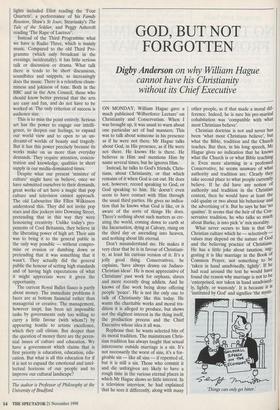GOD, BUT NOT FORGOTTEN
Digby Anderson on why William Hague cannot have his Christianity without its Chief Executive ON MONDAY, William Hague gave a much publicised 'Wilberforce Lecture' on Christianity and Conservatism. When I was brought up, it was usual to warn about one particular act of bad manners. This was to talk about someone in his presence as if he were not there. Mr Hague talks about God, in His presence, as if He were not there. He knows He is there. He believes in Him and mentions Him by name several times, but he ignores Him.
Instead, he talks to God's friends, Chris- tians, about Christianity, or that which remains of it when God is cut out. He does not, however, record speaking to God, or God speaking to him. He doesn't even seem to have contact with Him through the usual third parties. He gives no indica- tion that he knows what God is like, or is aware of the sorts of things He does. There's nothing about such matters as cre- ating the world, coming down to earth at the Incarnation, dying at Calvary, rising on the third day or ascending into heaven, and nothing about life eternal.
Don't misunderstand me. He makes it very clear that he is in favour of Christiani- ty, at least his curious version of it. It's a jolly good thing. Conservatives, he explains, 'have always drawn on Judaeo- Christian ideas'. He is most appreciative of Christians' past work for orphans, slaves and more recently drug addicts. And he knows of fine work being done offering people 'peace'. He is not the only one to talk of Christianity like this today. He wants the charitable works and moral tra- dition it is alleged to produce, but shows not the slightest interest in the thing itself, the production process and the Chief Executive whose idea it all was.
Rephrase that: he wants selected bits of its moral tradition. The mainstream Chris- tian tradition has always taught that sexual intercourse outside marriage is a sin. It's not necessarily the worst of sins, it's a for- givable sin — like all sins — if repented of, but it is still a sin. Those who commit it and die unforgiven are likely to have a rough time in the various eternal places in which Mr Hague shows so little interest. In a television interview, he had explained that he sees it differently, along with many other people, as if that made a moral dif- ference. Indeed, he is sure his pre-marital cohabitation was 'compatible with what most Christians believe'.
Christian doctrine is not and never has been 'what most Christians believe', but what the Bible, tradition and the Church teaches. But then, in his long speech, Mr Hague gives no indication that he knows what the Church is or what Bible teaching is. Even more alarming in a professed Conservative, he seems unaware of what authority and tradition are. Clearly they take second place to what people currently believe. If he did have any notion of authority and tradition in the Christian context, then he would have at least the odd qualm or two about his behaviour and the advertising of it. But he says he has to qualms'. It seems that the heir of the Con- servative tradition, he who talks so much about Burke, is into pick 'n' mix morality. What never occurs to him is that the Christian culture which he — selectively — values may depend on the nature of God and the believing practice of Christians. He has a little joke about taxation, sug- gesting it is like marriage in the Book of Common Prayer, not something to be `taken in hand unadvisedly, lightly'. If he had read around the text he would have found the reason why marriage is not to be `enterprised, nor taken in hand unadvised- ly, lightly, or wantonly'. It is because it is `instituted by God' and signifies 'the mysti- `Things can only get bitter.' cal union that is betwixt Christ and his Church'. It is not because careless mar- riages might break up and leave one-par- ent families pushing up the social security bill. It is because God has commanded life-long marriage. With divorce and deser- tion, what is primarily wrong in Christian terms is disobedience to God, the breaking of vows made before Him and desertion knowing the suffering it will cause. These God-related reasons plus the disapproval of the Church and other Christians are what have kept families together.
He much admires Wilberforce and his campaign against the slave trade. But he does not see that the sheer unrelenting effort of Wilberforce's moral campaign comes not just from faith in a word, 'God', but was his response to what he believed God had done for him. Again he com- mends an internationalist concern for the poor in foreign lands. A shame he has not read the great Conservative James Fitz- james Stephen. Stephen rightly repudiated the doctrine of fratemite as nauseous and unConservative. The only thing that could persuade him to love his brother, he said, was if he believed it was commanded by Almighty God. Among the Ten Com- mandments, those which demand a right relation to God come first; those con- cerned with our neighbour come after and depend on them. The reason the other men are our brothers is, according to Christian doctrine, that we all have a com- mon Father in God. The duty to the fellow man is indirect. It is not a horizontal obli- gation but one that goes up and down through God. Dump God and the obliga- tion to the fellow man goes. No fraternite without (common) paternite.
The speech assumes that Christian good works and selective morality will continue to be there for Conservatives to 'draw on' and 'reconnect with'. How long will Christ- ian morality and works last after Christian belief and practice have waned? How long can societies live off past spiritual capital? If Christian morality is in any way, howev- er time-lagged, dependent on the practice of Christian religion and the worship of the Christian God, then there is trouble coming, trouble which should have been the concern of this major speech.
The speech is billed as an attempt to mend relations between the Conservative party and the Church. They went bad, at least between the liberal elite in the Church and the government during the Thatcher years. Then, various Church reports, notably 'Faith in the City', made detailed remarks on employment, trade union, social security and taxation policy which were economically and sociological- ly illiterate. Now the Conservative party has had its revenge with a speech which, whatever political virtues it may have, is theologically vacuous, and bad manners.



















































































 Previous page
Previous page